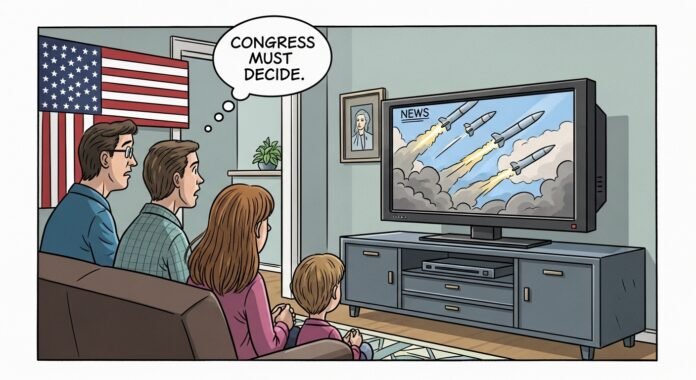Congressional Push for Restraint Amid Israel-Iran Escalation
The escalating conflict in the Middle East has forced American lawmakers to reexamine the balance of power between the executive branch and Congress. With Israel striking Iranian nuclear and military targets and Iran retaliating with ballistic missile attacks, Senator Tim Kaine has introduced a resolution that would require congressional approval before President Trump can order military action against Iran. This approach seeks to prevent the United States from becoming embroiled in another protracted war while preserving constitutional checks and balances.
The Urgency Behind the Resolution
A Response to Escalating Violence
On June 13, 2025, Israeli fighter jets struck multiple targets in Iran, including nuclear facilities and strategic military sites. The operation killed dozens of individuals, including top Iranian officials and scientists, and severely damaged critical infrastructure. In response, Iran launched over 100 missiles and drones at Israeli cities such as Tel Aviv. Although Israel’s advanced missile defense systems intercepted many of these projectiles, the intense exchange inflicted significant casualties and heightened fears of a wider regional conflict.
Reports from major news outlets such as NBC News and Al Jazeera have documented the swift escalation of violence. The threat of broader conflict has increased the justifiability of measures intended to limit rapid presidential military engagement.
The Role of Presidential War Powers
Historically, the United States Constitution grants Congress the power to declare war while designating the president as Command-in-Chief of the armed forces. The War Powers Resolution of 1973 was established to prevent presidents from unilaterally engaging in armed conflicts without legislative oversight. Yet, the balance has often tilted toward executive authority in times of crisis.
Senator Kaine’s new resolution seeks to reset that balance. By mandating a congressional vote before any hostile actions against Iran, the measure emphasizes that decisions to commit American lives to war must undergo robust public debate and judicial review. “The American people deserve a say before we send our sons and daughters into another war,” Kaine declared during a press briefing. This sentiment resonates with voters tired of the endless wars in Iraq and Afghanistan.
What the Resolution Entails
Key Provisions and Intent
Senator Kaine’s resolution introduces several measures aimed at reasserting Congress’s constitutional authority:
- It requires explicit congressional authorization before the United States deploys military forces against Iran.
- The president may still act only in cases of immediate self-defense, ensuring that rapid response is preserved when absolutely necessary.
- The resolution calls for a prompt debate and Senate vote, reinforcing the democratic process in decisions of war and peace.
This legislative move builds upon Kaine’s previous effort in 2020, which had passed Congress but was subsequently vetoed by President Trump. With the Israel-Iran conflict intensifying, the resolution assumes even greater urgency.
Historical and Constitutional Context
The Constitution clearly divides war powers between Congress and the president. This split was designed to prevent executive overreach and to ensure that all decisions leading to armed conflict are subject to public scrutiny. The War Powers Resolution of 1973 was a direct response to past abuses of presidential power during the Vietnam War era. Although subsequent presidents have often found ways to operate outside its strictures, Kaine’s resolution is an attempt to reengage these constitutional safeguards.
Legal experts point to historical precedents such as the Korean War and post-9/11 military actions as examples where presidential authority sometimes overshadowed congressional intent. The resolution now under consideration is a clarion call to restore balance and ensure that any further escalation in the Middle East is supported by a clear mandate from elected representatives.
Bipartisan and Public Reactions
Divergent Political Views
The resolution has sparked vigorous debate among lawmakers and constituents:
-
Democratic Leaders
Many Democrats support the resolution, arguing that unchecked executive power can lead to hasty military decisions. House Minority Leader Hakeem Jeffries, for instance, has urged restraint and careful deliberation, stating that involving Congress is essential for accountability and transparency. -
Republican Voices
Among Republicans, opinions are mixed. A faction supports strong measures against Iran to deter its nuclear ambitions, while an increasing number express concern over another expeditionary war that could drag the United States into a long and costly conflict. Senator Tom Cotton has argued for decisive action, yet others advocate for a return to congressional oversight.
Public Sentiment and Antiwar Advocacy
Public opinion appears to be shifting in favor of increased congressional oversight. While detailed polling data remains limited, media reports indicate that voters are weary of the financial and human costs of prolonged military engagements abroad. Antiwar advocates and civic groups have welcomed Kaine’s resolution, viewing it as a necessary step to ensure that future military actions are deliberate and democratically sanctioned.
Political and Legal Hurdles
The Veto Challenge
Despite the bipartisan calls for a cautious approach, the governing dynamics in Washington present significant obstacles. The resolution requires passage by both houses of Congress and the president’s signature. Given President Trump’s history of vetoing measures that restrict his authority, the bill’s future remains uncertain. In a politically charged environment, where the balance of power is delicate, every vote counts.
Legal Challenges and Constitutional Debates
The debate over the war powers resolution is not merely political but also deeply rooted in constitutional law. Critics argue that the president’s ability to act swiftly in defense of national interests should not be compromised by bureaucratic delays. Conversely, proponents insist that unchecked executive decisions can lead the country into conflicts that lack broad democratic support.
Legal scholars have noted that the fundamental question is whether modern conflicts, as seen in the Israel-Iran crisis, require a reinterpretation of the War Powers Resolution. The resolution poses a seminal test of whether constitutional principles can effectively limit executive overreach in the face of urgent security threats.
The Broader Impact on U.S. Foreign Policy
Reassessing America’s Role in the Middle East
The move to rein in presidential war powers comes at a crucial juncture. With the escalation between Israel and Iran, American involvement is once again under the spotlight. While the United States has long served as a security guarantor for allies in the region, the costs of these commitments are increasingly coming under scrutiny. Lawmakers are reevaluating whether unrestrained military aid and unilateral action truly serve American interests in a rapidly changing geopolitical landscape.
International Implications
Senator Kaine’s resolution does more than address domestic concerns. It sends a clear message to global leaders that the United States is serious about reestablishing a system of checks and balances when it comes to military engagement. International observers are watching closely, as any U.S. misstep in the Israel-Iran conflict could have far-reaching consequences for global stability. The resolution, therefore, is not merely a domestic policy issue but a factor in the broader quest for peace and stability in the Middle East.
Expert Analysis and Future Implications
Balancing Executive Authority with Congressional Oversight
Experts agree that the resolution represents an important experiment in rebalancing power. While presidents have historically claimed broad authority in matters of national defense, this measure reinforces the idea that war decisions should be as much a matter of public policy as they are of executive prerogative. Analysts argue that if successful, the resolution could serve as a model for future legislative efforts aimed at curbing executive overreach in military matters.
Data, Statistics, and the Public Interest
Preliminary data from conflict zones in the Middle East highlights the risks of rapid military escalation. Iranian state media has reported fatalities numbering in the dozens from Israeli airstrikes, while Israeli defense sources confirm that missile defenses intercepted most Iranian projectiles, leaving casualties in their wake. These figures underscore the human cost of conflict and bolster the argument that every military action should be preceded by thorough deliberation and democratic approval.
As the debate over war powers continues, the resolution has become a focal point for discussions about the proper use of military force in today’s volatile international environment. Scholars, politicians, and citizens alike agree that ensuring accountability in matters of war is essential to preserving both American lives and global stability.
A Defining Moment for American Democracy
Senator Kaine’s war powers resolution stands as a bold effort to restore the constitutional balance between Congress and the president. In the midst of an escalating crisis between Israel and Iran, the measure reminds us that decisions involving the deployment of military force should never be taken lightly. With average Americans weary of endless engagements abroad, this resolution offers a path toward a more deliberate and democratically grounded foreign policy.
The stakes are high. As the debate unfolds in Capitol Hill, it is clear that the resolution is not just about limiting a president’s power but about reaffirming the principles of democratic accountability. Now is the time for citizens to engage, learn more about these crucial issues, and ensure that their voices are heard in this debate.
If you believe that our nation must avoid another costly war and protect the sanctity of our constitutional system, contact your representatives and join the conversation. Let us work together to shape a future where wisdom and deliberation guide our nation’s decisions on the world stage.




